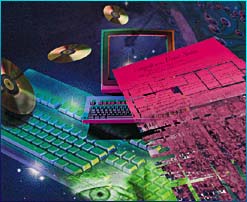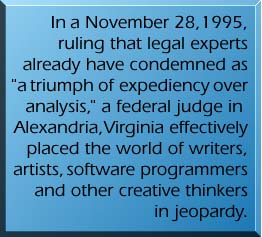


 magine this: the labors of decades of extensive research result in a work that is an important and valuable proprietary work — a trade secret — something that you decide will never be published, but kept only for those you allow to see it.
magine this: the labors of decades of extensive research result in a work that is an important and valuable proprietary work — a trade secret — something that you decide will never be published, but kept only for those you allow to see it.
To maintain its integrity you implement intense and exacting security procedures. You also register the work for copyright, in the unique form used when registering trade secrets and unpublished works. But then someone dons a uniform and forges credentials pretending to be one of your staff and steals a copy of your work.
The thief is caught and goes to jail. But a year later you find that he had made a copy and secretly sent it to another, who then passed it to an individual who posted it on the Internet. Naturally, you seek recourse in the courts.
The Judge then rules that because the material has been posted on the Internet, it has lost any protection. Sound impossible?
Unfortunately, this is exactly what happened recently in a Federal District Court in Virginia. If allowed to stand, the ruling signals the death knell for intellectual properties. In effect, if Bill Gates and Microsoft were to develop new — but not yet released — software, and it was stolen and then given by the thief to another who posted it on the Internet with knowledge that it was stolen — there would be no recourse.
Anyone engaged in any form of creative endeavor depends on their works — and their control over them — to make a living. The right to protect one’s creations is guaranteed in the Constitution because the founding fathers understood how important creative people are to a healthy society. It would of course be abhorrent to create something and then see it used contrary to your wishes, with another reaping the benefits in your stead.
Yet, in a November 28, 1995, ruling that legal experts already have condemned as “a triumph of expediency over analysis,” federal judge Leonie Brinkema of Alexandria, Virginia effectively placed the world of writers, artists, software programmers and other creative thinkers in jeopardy. Based on her ruling, their reliance on intellectual property rights such as copyright may be worth nothing when thieves set out to deprive them of those rights. And all it takes is placing a copy of the stolen material on the Internet.
Judge Brinkema ruled — without a trial — that anyone who publishes excerpts from unpublished, copyrighted, trade secret works known to have been stolen from their owner is nonetheless free from liability so long as those documents were at one time available on the Internet. In effect, the judge ruled that once any document — even one which is thoroughly protected and unpublished — hits the net, it is a “free-for-all” — a conclusion utterly unsupported by the law.

This saga began when a copy of some of the confidential scriptures of the Church of Scientology was obtained by Arnaldo Lerma of Arlington, Virginia. Lerma has varying stories about where he got his copy, but nonetheless as a former Church member, he knew the Church protected these materials closely and that the copy he got came from a theft. Lerma posted the materials on the Internet, and then tried to sanitize the “hot” documents by sending them to a friend at the Washington Post for safekeeping.
 Small-time criminals who traffic in stolen property are routinely jailed by courts from coast to coast. In this case, though, Lerma and the Post escaped even civil liability, thanks to a ruling that jeopardizes intellectual property rights and the scope of their protections for everyone who earns a living with words, music, a paintbrush, or any other device that symbolizes creativity and the progress of valuable ideas.
Small-time criminals who traffic in stolen property are routinely jailed by courts from coast to coast. In this case, though, Lerma and the Post escaped even civil liability, thanks to a ruling that jeopardizes intellectual property rights and the scope of their protections for everyone who earns a living with words, music, a paintbrush, or any other device that symbolizes creativity and the progress of valuable ideas.
Judge Brinkema absolved Lerma and the Post of liability for the misappropriation by stating that “regardless of the documents’ status as trade secrets,” there was no liability. Her justification? That the protected works were, for a time, available in a now sealed court file and had been posted on the Internet (by Lerma) — and therefore any protection afforded to those works is forfeited.
Her ruling flies in the face of federal law and the laws of every state. To reach those extraordinary conclusions, the judge disregarded crucial uncontroverted facts — not the least of which was that no fewer than the 17 leading trade secrets law experts and the 12 leading copyright law experts in the country filed expert analyses under oath explaining to the judge that the conduct of the defendants could not and must not be sheltered from liability.
One legal authority — who practices in the district court in question and requested anonymity — termed the decision “shortsighted and remarkably shallow.” Another said that “the absence of coherent legal analysis under the facts present suggests that the real power of the press in this circumstance is the power to intimidate the judge into finding for the Post rather than following the legal precepts that should have guided her.”

The impact of such a ruling is broad and chilling. It is a potential intrusion upon every creative individual who relies on copyrightsand trade secret law to protect his or her own work.
The computer and software industries are filled with individuals and companies that depend on intellectual property rights for their works. Last year, Microsoft Corp. announced that as a result of raids in California, Georgia, Louisiana, Maryland, Texas and Virginia, more than 13,000 counterfeit packages and numerous components were seized. The Business Software Alliance says it has filed more than 400 suits and conducted hundreds of raids against suspected copyright infringers. But under this ruling, if a single work is posted a single time on the Internet — all bets are off and these manufacturers will have no way of protecting their rights. It is clear that the result will be either a massive increase in the cost of computer software, or stifled creativity. Either way, the consumer loses and only the perpetrator of the theft gains.
The Court in Virginia insulated the lawlessness and decimated the rights it is charged with protecting. The biggest injustice might ultimately be the conclusion of writers and artists alike that the only way to secure control over their thoughts, words and ideas is to keep them to themselves and avoid the risk of abuse at the hands of dishonest people and the indifference of a judicial forum — the very event that intellectual property laws were meant to prevent.

